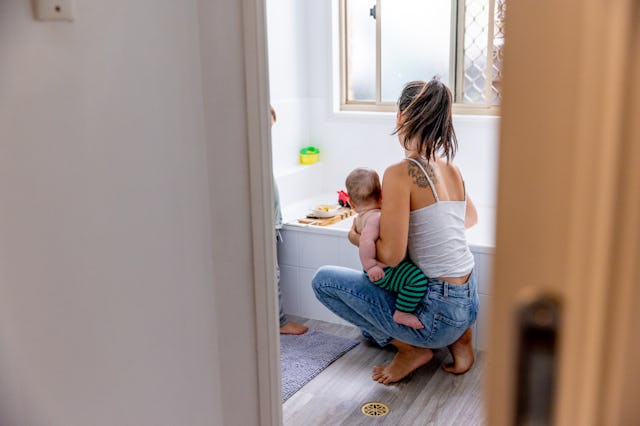Abortion Is Not The Opposite Of Motherhood
“Abortion is something women have done forever to protect and keep caring for the children they have,” says Hannah Matthews, abortion doula and author of the new book You Or Someone You Love.

As my children approach reproductive age, they are confronted with a future that is less free. The worry and fear I experience as a parent is all-consuming, knowing how little control and say they will now have over their autonomy, their futures, and their health. I’m devastated to be raising children in a world in which an unwanted and unintended pregnancy is a death sentence in a growing number of states, bolstered by conservative efforts toward a federal ban on abortion. Instead of empowering them to choose when, if, and how they want to eventually build families, we have to talk about safety in a completely different way.
And that’s exactly what makes You or Someone You Love: Reflections From An Abortion Doula, a new book by author Hannah Matthews, so urgent.
Matthews interlaces personal anecdotes and interviews with actionable guidance for supporting someone through an abortion, or experiencing one yourself. Nearly one in four women in the United States will have an abortion by age 45, meaning that almost everyone knows someone who has needed or will need abortion care, something Matthews repeatedly emphasizes not only in her book but also when I reached out to talk with her. “I just think it's so important to always be driving home that it could be any of us at any moment who needs or wants an abortion,” she told me.
That’s particularly true of moms. Most people who have abortions are parents and identify as mothers, including Matthews.
“Abortion has always been in a mother's arsenal or tool kit for keeping her family safe and healthy and fed and cared for,” she says. “If you're someone who's capable of pregnancy, any pregnancy outcome is incredibly ancient and normal and human and biological and that includes you taking control over it. Abortion is something women have done forever to protect and keep caring for the children they have.”
Of course, it was publicly sharing her own abortion experience, woven throughout her book, that made her a target of vitriolic hate and harassment online. In mainstream culture, abortion is often painted as “the antithesis of love and parenting children, the opposite of motherhood,” Matthews writes.
But, as she maintains, motherhood is not in opposition to abortion; it is “often an act of parenting, of mothering, of creation, of loving and protecting one’s family. Especially, as we're moving back into a place where giving birth is really dangerous and pregnancy is really dangerous, especially for Black women, especially for poor women, it is completely an act of motherhood. You have to say nope, I'm gonna stay healthy and alive and not pregnant and I'm not going to give birth because I need to be here for the children I have.”
She wants us to see abortion differently. Transition, loss, trauma, joy, ceremony, transformation are just some of the words Matthews uses to describe the procedure in the book. It’s a combination of emotional comfort and practical guidance, offering safety instructions, informative protocols, and digital security tips, as well as advice on pain management, support groups, and hotlines, plus what you might want to include in a care package for a friend.
But it all boils down to something pretty simple. In her work as a doula and clinic worker, Matthews often hears a plea for someone to “just be there for me.”
“I truly believe there's a place in the movement for everyone,” Matthews says. And it’s a big part of the reason she wrote the book. “It doesn't have to be this big, life-interrupting thing. You can give someone $50; you can give someone a ride to the airport. If you are someone that people know is safe, you are automatically in that network of people that can be reached out to.”
These examples merely scratch the surface of how community abortion care and support can look. In Matthews’ view, supporting people who seek abortions can be a joyful act of transformative community activism. Abortion, all pregnancy outcomes, and bodily autonomy are fundamental aspects of human life and are not new or abnormal. “These are truly as old as humans ourselves. Abortion is a basic thing. The same way a period is, the same way birth control and sex are,” she says.
Matthews hopes, most of all, the book reaches those who are having abortions and feeling alone or who don’t have support from people in their lives. “I really wanted these stories to be told and I really wanted this book to not be just about my experience and my work, because everyone's abortion is different and everyone's work is different. Abortion, after all, is not one “monolithic thing,” so support and care shouldn’t be, either. I don’t how my children’s lives will unfold, but with Matthews’ book, I feel more equipped to help guide them through the fraught landscape they’ll face as they make decisions about their relationships and their bodies.
Molly Wadzeck Kraus is a freelance writer and mother of three. Born and raised in Waco, Texas, she moved to the Finger Lakes region of New York, where she worked in animal rescue and welfare for many years. She writes essays and poems about feminism, mental health, parenting, pop culture, and politics. She is usually late because she stopped to pet a dog. She tweets at @mwadzeckkraus.
This article was originally published on